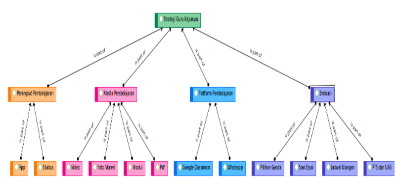Tools:
Journal Indexed by:
VISITOR


The implementation of learning carried out by vocational school teachers during the Covid-19 pandemic has a complexity of problems. This study aims to determine the extent to which the strategies of SMK teachers in carrying out the learning process during the Covid-19 pandemic. The method used in this research is qualitative with a case study approach. Data collection techniques with interview and documentation methods. Data analysis was carried out with the help of Atlas.ti software version 8. The results of this study include 1) before carrying out learning the teacher implements a lesson plan by preparing a syllabus and learning implementation tools; 2) using various kinds of media used in carrying out learning, namely using videos and modules; 3) using technology that supports learning activities by utilizing the google classroom and whatsapp group applications; and 4) using student learning evaluation to determine the extent to which students master the material that has been given.
M. RI, “Pelaksanaan kebijakan pendidikan dalam masa darurat penyebaran corona virus disease (covid-19).” pp. 1–3, 2020.
Z. Abidin, A. Hudaya, and D. Anjani, “Efektivitas Pembelajaran Jarak Jauh Pada Masa Pandemi Covid-19,” Research and Development Journal of Education, vol. 1, no. 1, p. 131, 2020, doi: 10.30998/rdje.v1i1.7659.
I. F. N. D. Primasari and Zulela, “Kendala pembelajaran jarak jauh (pjj) secara online selama masa pandemik covid-19 di sekolah dasar,” JIKAP PGSD: Jurnal Ilmiah Ilmu Kependidikan, vol. 5, no. 1, pp. 64–73, 2021.
S. R. A. Utomo and F. N. Mahmudah, “The implementation of distance learning during the covid-19 pandemic,” Jurnal Madrasah, vol. 13, no. 2, pp. 114–125, 2021, doi: 10.18860/mad.v13i2.11330.
D. S. Kharisma Danang Yuangga, “Pengembangan media dan strategi pembelajaran untuk mengatasi permasalahan pembelajaran jarak jauh di pandemi covid- 19,” Jurnal Guru Kita, vol. 4, no. 3, pp. 51–58, 2020.
E. K. P. Bramistia, “Program bantuan kuota belajar kemendikbud di masa pandemi,” Jurnal Epistema, vol. 2, no. 1, pp. 11–22, 2021.
N. Safitri, “Peran guru pada pembelajaran jarak jauh di masa pandemi covid-19 di sekolah dasar,” Universitas Jambi, 2021.
K. D. A. A. Meirza Nanda Faradita, “Pelatihan pembuatan rpp kurikulum darurat pada masa pandemi,” Jurnal Altifani, vol. 1, no. 3, pp. 258–266, 2021, doi: 10.25008/altifani.v1i3.166.
S. M. Cahyono, B. Kartawagiran, and F. N. Mahmudah, “Construct exploration of teacher readiness as an assessor of vocational high school competency test,” European Journal of Educational Research, vol. 10, no. 3, pp. 1471–1485, 2021, doi: 10.12973/eu-jer.10.3.1471.
M. Syahroni, F. E. Dianastiti, and F. Firmadani, “Pelatihan media pembelajaran berbasis teknologi informasi untuk meningkatkan keterampilan guru dalam pembelajaran jarak jauh,” International Journal of Community Service Learning, vol. 4, no. 3, pp. 170–178, 2020.
F. N. Mahmudah, E. C. Putra, and B. H. Wardana, “The impact of covid-19 pandemic: external schock of disruption education and financial stress cohesion,” FWU Journal of Social Sciences, vol. 15, no. 2, pp. 42–64, 2021, doi: 10.51709/19951272/Summer-2/3.
A. Ha. U. Agus Salim, Hamsi Mansur, “Evaluasi ketepatan pemilihan media pembelajaran jarak jauh di masa pandemi covid-19,” Jurnal Ilmiah Keislaman dan Kemasyarakatan, vol. 20, no. 1, pp. 102–116, 2020.
I. F. Ahmad, “Asesmen alternatif dalam pembelajaran jarak jauh pada masa darurat penyebaran coronavirus disease (covid-19) di indonesia,” Jurnal Pedagogik, vol. 07, no. 01, pp. 195–222, 2020.
F. N. Mahmudah, Analisis penelitian kualitatif manajemen pendidikan berbantuan software Atlas.ti versi 8, 1st ed. Yogyakarta: UAD Press, 2021.
H. Putri and J. Silalahi, “Pengaruh model pembelajaran collaborative learning tipe jigsaw terhadap hasil belajar mekanika teknik siswa kelas x dpib smk n 1 koto xi tarusan,” Journal of Civil Engineering and Vocational Education, vol. 5, no. 4, pp. 1–7, 2018.
F. N. Mahmudah, “Self-innovation guru dalam meningkatkan prestasi siswa pada masa pandemi COVID-19,” Ta’dibuna: JUrnal Pendidikan Islam, vol. 10, no. 1, pp. 119–134, 2021, doi: 10.32832/tadibuna.v10i1.4075.
A. Fatmawati, “Pengembangan perangkat pembelajaran konsep perencanaan lingkungan menggunakan model pembelajaran berdasarkan masalah untuk sma kelas x,” Jurnal Pendidikan Sains dan Matematika, vol. 4, no. 2, pp. 94–103, 2016.
M. Nurtanto, “Mengembangkan kompetensi profesionalisme guru dalam menyiapkan pembelajaran yang bermutu,” Prosiding Seminar Nasional Pendidikan, pp. 553–565, 2016.
M. Rajabi and I. G. P. A. Buditjahjanto, “Pengembangan perangkat pembelajaran instalasi sistem operasi dengan model pembelajaran berbasis proyek,” Jurnal Pendidikan Vokasi, vol. 3, no. 1, pp. 48–54, 2015.
Y. G. Nidal Zuwida, Laras Oktavia Andreas, “Analisis kebutuhan mahasiswa terhadap media pembelajaran pada mata kuliah rekayasa batu dan beton,” Journal of Civil Engineering and Vocational Education, vol. 8, no. 1, pp. 38–43, 2021.
A. A. Unik Hanifah Salsabila, Lailli Irna Sari, Khusna Haibati Lathif, Ayu Puji Lestari, “Peran tekmologi dalam pembelajaran di masa pandemi covid-19,” Jurnal Penelitian dan Kajian Sosial Keagamaan, vol. 17, no. 2, pp. 188–198, 2020, doi: 10.46781/al-mutharahah.v17i2.138.
P. Setiono, “Juridikdas strategi guru dalam pembelajaran daring pada masa covid -19 di sekolah sasar,” Jurnal Riset Pendidikan Dasar, vol. 3, no. 3, pp. 402–407, 2020.
R. Asrul, Rusydi Ananda, Evaluasi Pembelajaran. Bandung : Citapustaka Media, 2014.
Wildan, “Pelaksanaan penilaian autentik aspek pengetahuan, sikap dan keterampilan di sekolah atau madrasah,” Jurnal Pemikiran dan Penelitian Pendidikan, vol. 15, no. 2, pp. 131–153, 2017.

